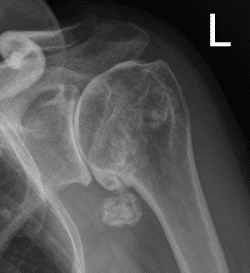 Just like the knee and the hip joints, the shoulder cartilage can also undergo degeneration. When the cartilage surfaces are lost and the bones rub against each other, patients can suffer from shoulder osteoarthritis. Often this is associated with loss of movements that doesn't get better with physiotherapy and stretching, and patients describe and aching pain "deep inside" the shoulder, which occurs even at rest, and is worsened by activities.
Just like the knee and the hip joints, the shoulder cartilage can also undergo degeneration. When the cartilage surfaces are lost and the bones rub against each other, patients can suffer from shoulder osteoarthritis. Often this is associated with loss of movements that doesn't get better with physiotherapy and stretching, and patients describe and aching pain "deep inside" the shoulder, which occurs even at rest, and is worsened by activities.
Initial treatments include avoiding the activities that worsen the pain. As needed painkillers like paracetamol or even NSAIDS like arcoxia or voltaren can be helpful. Glucosamine supplements have been shown to reduce joint pains in a small percentage of patients with joint degeneration, and can be tried, with the knowledge that they do not "grow back" cartilage or "prevent" further cartilage degeneration. Physiotherapy is often not that useful, as the loss of movements is a result of gradual change in shape of the bones due to the degeneration, and trying to "stretch the shoulder movements back" sometimes causes more pain.
If conservative treatments have failed and the shoulder pain is persistent and unacceptable, shoulder replacement surgery can be performed with high rates of pain relief and patient satisfaction.
